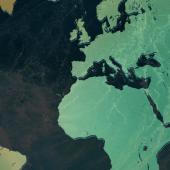Smithsonian scientists are using satellite technology to better understand how we can conserve the critically endangered Asian elephant.

Title
- Conservation Biologist, Smithsonian Conservation Biology Institute
Recent Publications
- Assessment of Mining Extent and Expansion in Myanmar Based on Freely-Available Satellite Imagery (2016)
- Mapping Distinct Forest Types Improves Overall Forest Identification Based on Multi-Spectral Landsat Imagery for Myanmar’s Tanintharyi Region (2016)
- Drivers of Change in Myanmar’s Wild Elephant Distribution (2016)
- How do two giant panda populations adapt to their habitats in the Qinling and Qionglai Mountains, China (2015)
- Comparative movement analysis for a sympatric dhole and golden jackal in a human-dominated landscape (2015)
Locations
- Sri Lanka
Melissa Songer is a conservation biologist researching ways to help sustain and restore species in the wild.
Since 1999, Melissa has worked on the conservation and ecology of endangered species in Asia with the Conservation GIS Lab at the Smithsonian Conservation Biology Institute (SCBI) in Front Royal, Virginia. She uses advanced geospatial technologies to detect human transformation of the landscape and assess its impacts on endangered species and ecosystems.
Her current projects include restoring Przewalski's horses to native ranges in China and Mongolia; tracking movements of Asian elephants and human-elephant conflict in changing landscapes in Asia; understanding giant panda landscapes and the effects of climate change on their habitat; tiger landscapes in Bangladesh; and reintroducing scimitar-horned oryx to the Sahel in Chad. She leads the Smithsonian Myanmar Initiative, a pan-science effort to support research and build in-country capacity for conservation of Myanmar’s biodiversity.
In addition to her own research, Melissa trains professionals, graduate students, and teachers in conservation, and geospatial and wildlife monitoring technologies. She has trained more than 900 individuals representing over 40 countries. She is helping to build a global network of conservation professionals through mentoring interns, graduate students, and conservation professionals in the U.S. and around the world. Melissa received her MS in Zoology from the University of Oklahoma and her PhD from the University of Maryland.